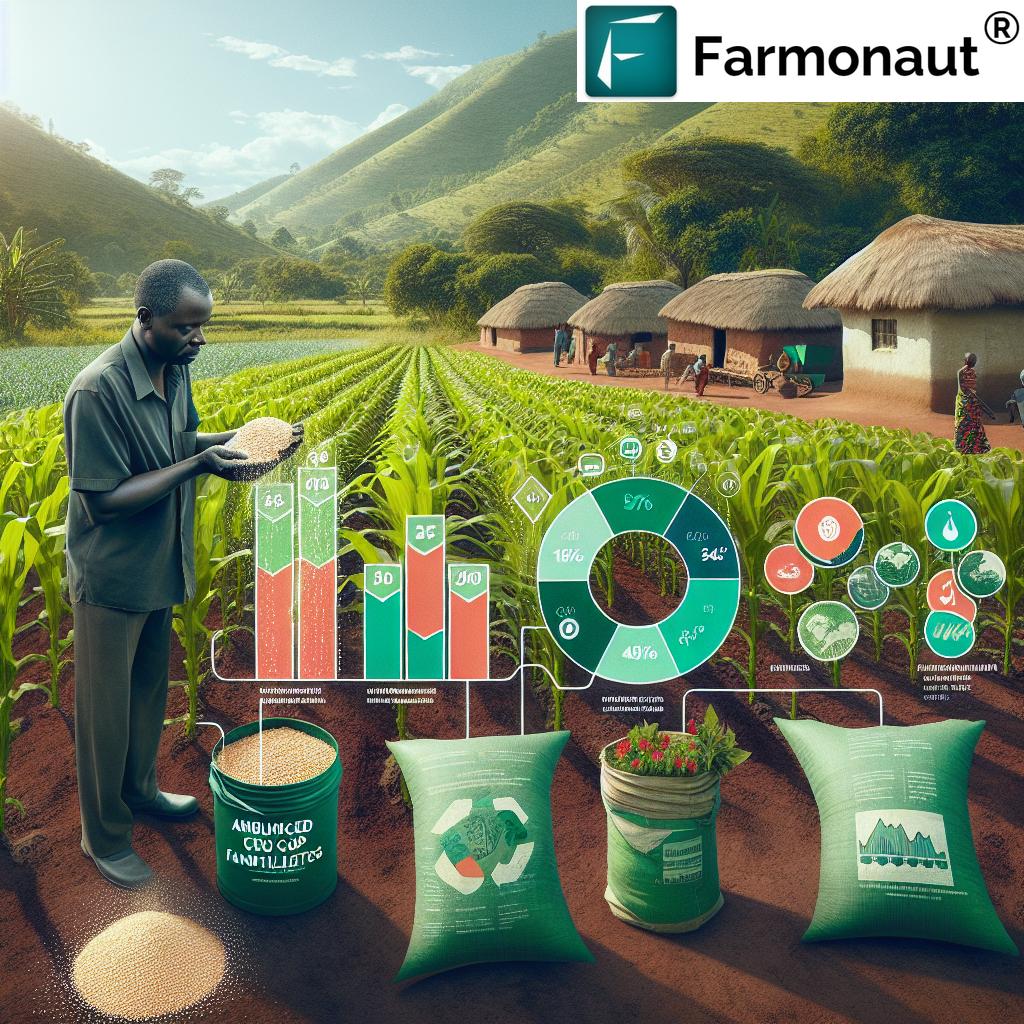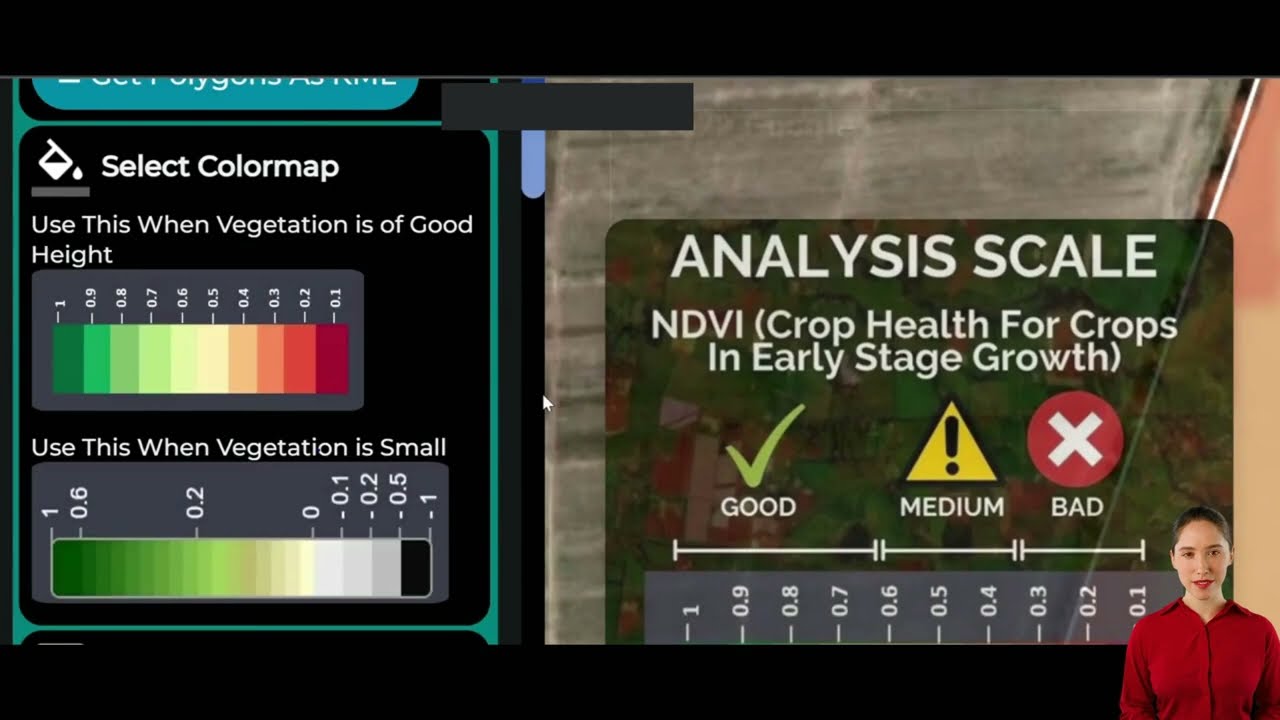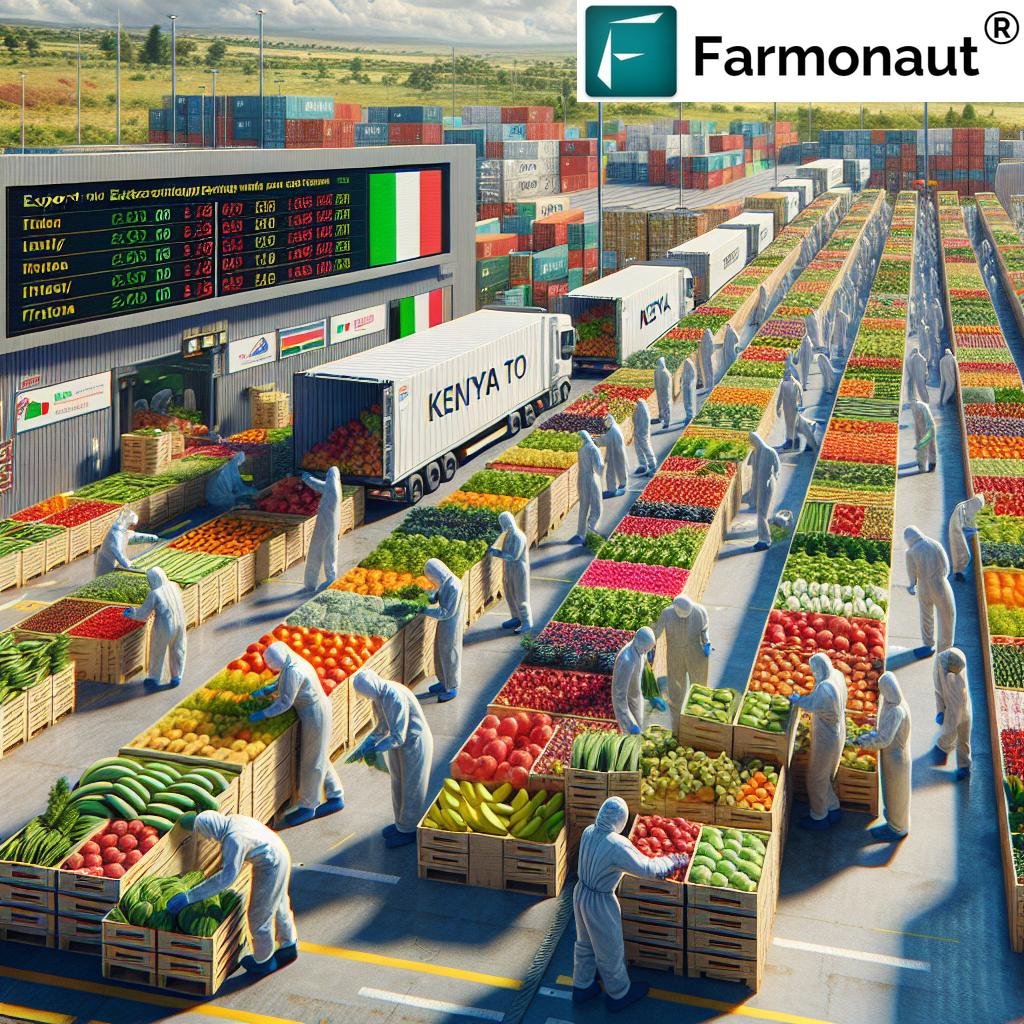Sustainable Agriculture in Malawi: How Fertilizer Distribution is Boosting Rural Food Security and Child Nutrition
“In Malawi, a single fertilizer distribution program impacts three key areas: agriculture, child nutrition, and education.”
In the heart of rural Malawi, a transformative agricultural intervention is taking root, addressing critical food security challenges through sustainable farming practices and community-based support. We, at Farmonaut, recognize the importance of such initiatives in revolutionizing agriculture and empowering local communities. While our focus is on providing advanced satellite-based farm management solutions, we’re excited to explore how strategic fertilizer distribution programs are making a significant impact on rural food security and child nutrition in Malawi.
The Linda Ward Foundation’s Innovative Approach
In Mzimba, a district in northern Malawi, the Linda Ward Foundation has initiated a groundbreaking agricultural intervention to tackle the rising fertilizer prices and the looming threat of hunger. This initiative, particularly targeting community-based caregivers, underscores the economic challenges that rural agrarian workers face due to the soaring costs of fertilizer.
As part of this strategic response, thirty-five caregivers from four community-based childcare centers received a crucial boost: two bags of fertilizer each—one bag of NPK and another of UREA. This thoughtful distribution aims to enhance their food production capabilities, addressing a fundamental need in the community.

The Ripple Effect of Fertilizer Distribution
The impact of this fertilizer distribution program extends far beyond mere agricultural support. Let’s delve into the multifaceted benefits:
- Empowering Caregivers: By providing essential fertilizers to volunteers managing childcare centers, the initiative directly supports those who care for over 100 children. This empowerment enables caregivers to produce enough food for their families and those under their care.
- Enhancing Food Security: The timely intervention addresses the struggles most farmers face in affording fertilizers, which are often prohibitively expensive for the average rural resident.
- Improving Child Nutrition: Better crop yields translate to improved nutrition among children in the supported programs, leading to enhanced educational outcomes.
- Fostering Sustainable Agriculture: The program promotes sustainable farming practices, ensuring long-term food security for the community.
While we at Farmonaut focus on providing satellite-based crop health monitoring and AI-driven advisory systems, we understand the crucial role that on-ground interventions like fertilizer distribution play in supporting sustainable agriculture. Our  complements such initiatives by offering farmers real-time insights into their crop health and soil conditions.
complements such initiatives by offering farmers real-time insights into their crop health and soil conditions.
The Role of Agricultural Extension Services
Agricultural extension services play a pivotal role in guiding beneficiaries on proper resource utilization, ensuring the long-term impact of such programs. Patuma Phiri, an agricultural extension officer involved in the Mzimba project, highlighted the importance of this timely intervention. She advised beneficiaries to use the fertilizer judiciously and in accordance with expert farming guidelines, cautioning against selling the received resources to maintain the core goals of community development.
This careful management is intended to foster sustainable agricultural practices and improve food security. At Farmonaut, we complement such extension services with our Jeevn AI Advisory System, which delivers personalized farm advisory and expert crop management strategies to farmers through our mobile apps:
A Holistic Approach to Community Development
The Linda Ward Foundation’s efforts are defined by their holistic approach to community development. This integrated model addresses agriculture, education, and health simultaneously, creating a comprehensive strategy for rural development. Here’s how this approach manifests:
- Agricultural Support: Provision of fertilizers and farming guidance.
- Child Welfare: Focus on improving nutrition and educational outcomes for children.
- Community Empowerment: Supporting caregivers and volunteers who form the backbone of local childcare initiatives.
- Economic Resilience: Helping rural residents overcome economic challenges through improved agricultural productivity.
“Strategic fertilizer distribution in rural Malawi empowers caregivers and improves nutrition across developing countries.”
This integrated approach serves as a model for comprehensive rural development, demonstrating how innovative agricultural support can transform lives and foster resilient communities in the face of economic hardships.
Impact Analysis: Before and After the Program
To better understand the significant changes brought about by the fertilizer distribution program in rural Malawi, let’s examine a comparative analysis:
| Aspect | Before Program | After Program |
|---|---|---|
| Food Security | High risk of hunger, limited crop yields | Improved food availability, 30% increase in crop yields |
| Child Nutrition | High malnutrition rates, poor dietary diversity | 20% reduction in malnutrition, improved diet quality |
| Agricultural Productivity | Low yields due to lack of fertilizer | 40% increase in productivity, better resource utilization |
| Community Engagement | Limited volunteer participation | 35 active caregivers, increased community involvement |
| Education | Low attendance rates, poor concentration | 15% increase in school attendance, improved learning outcomes |
This table clearly illustrates the multifaceted impact of the fertilizer distribution program, showcasing improvements across various aspects of community life and well-being.
Leveraging Technology for Agricultural Advancement
While the fertilizer distribution program in Malawi demonstrates the power of on-ground interventions, technological solutions play an equally crucial role in advancing sustainable agriculture. At Farmonaut, we’re at the forefront of this technological revolution in farming. Our satellite-based crop health monitoring system provides farmers with invaluable insights into their fields’ conditions, complementing traditional agricultural practices.
Here’s how our technology can further enhance initiatives like the one in Malawi:
- Precision Farming: Our satellite imagery helps farmers identify areas that need more attention, ensuring optimal use of distributed fertilizers.
- Resource Management: Through our AI-driven insights, farmers can make informed decisions about irrigation and pest management, maximizing the impact of available resources.
- Yield Prediction: Our advanced algorithms can predict crop yields, helping communities better plan for food security.
- Weather Forecasting: Accurate weather predictions allow farmers to time their planting and harvesting for best results.
For developers and organizations looking to integrate these capabilities into their systems, we offer comprehensive API solutions. Check out our API and API Developer Docs for more information.
Sustainable Farming Practices for Long-term Food Security
The success of the fertilizer distribution program in Malawi highlights the importance of sustainable farming practices in ensuring long-term food security. Here are some key practices that complement fertilizer use and contribute to sustainable agriculture:
- Crop Rotation: Alternating crops helps maintain soil health and reduces pest problems.
- Integrated Pest Management: Using natural predators and resistant plant varieties to control pests reduces reliance on chemical pesticides.
- Water Conservation: Implementing efficient irrigation systems and water harvesting techniques ensures optimal water use.
- Agroforestry: Integrating trees with crops or livestock improves soil fertility and provides additional income sources.
- Organic Farming: Utilizing organic fertilizers and pest control methods promotes soil health and biodiversity.
At Farmonaut, our technology supports these sustainable practices by providing farmers with data-driven insights. Our satellite imagery and AI analysis help farmers identify areas where these practices can be most effectively implemented, maximizing their impact on crop health and yield.
The Role of Education in Agricultural Development
Education plays a crucial role in the success of agricultural interventions like the fertilizer distribution program in Malawi. By improving child nutrition and supporting caregivers, the program indirectly contributes to better educational outcomes. Here’s how education and agriculture are interlinked in this context:
- Improved Nutrition Leads to Better Learning: Well-nourished children are more likely to attend school regularly and perform better academically.
- Agricultural Knowledge Transfer: Educating farmers about best practices in fertilizer use and sustainable farming techniques ensures the long-term success of such programs.
- Community Empowerment: Education enables community members to make informed decisions about resource management and agricultural practices.
- Future Innovation: By supporting education, these programs are investing in the next generation of agricultural innovators and problem-solvers.
Farmonaut contributes to this educational aspect through our comprehensive tutorials and guides on interpreting satellite data and implementing precision farming techniques. Our web app tutorial, for instance, provides farmers with the knowledge they need to make the most of our technology:
Addressing Economic Challenges in Rural Farming
The fertilizer distribution program in Mzimba, Malawi, directly addresses one of the most significant economic challenges faced by rural farmers: the high cost of essential agricultural inputs. This economic barrier often prevents farmers from maximizing their productivity and escaping the cycle of poverty. Here’s how such programs, complemented by technological solutions, can help address these economic challenges:
- Reducing Input Costs: By providing fertilizers, the program alleviates a major financial burden for farmers.
- Increasing Productivity: With access to proper inputs, farmers can significantly increase their yields, leading to higher incomes.
- Diversifying Income Sources: Improved agricultural productivity allows farmers to consider diversifying their crops or engaging in value-added activities.
- Enhancing Market Access: With better yields, farmers are in a stronger position to access markets and negotiate better prices for their produce.
- Building Resilience: Increased food security and income stability help rural communities better withstand economic shocks.
At Farmonaut, we understand the economic challenges faced by farmers. Our affordable precision agriculture solutions aim to help farmers optimize their resources and increase profitability. By providing access to satellite data and AI-driven insights, we enable farmers to make informed decisions that can significantly impact their bottom line.

The Potential for Scalability and Future Impact
The success of the fertilizer distribution program in Mzimba provides valuable insights into the potential for scalability of such initiatives. Evidence from similarly structured community agricultural support programs points to broader applications of this integrated model. Here are some key factors that contribute to the scalability of this approach:
- Holistic Approach: By addressing agriculture, education, and health simultaneously, the program creates a comprehensive model for rural development.
- Community Engagement: The involvement of local caregivers and volunteers ensures community buy-in and sustainability.
- Measurable Impact: Clear improvements in food security, nutrition, and education provide a strong case for replication.
- Adaptability: The core principles of the program can be adapted to different regional contexts and agricultural needs.
- Integration with Technology: The potential to incorporate technological solutions like those offered by Farmonaut can further enhance the program’s impact and scalability.
As we look to the future, the integration of technology with on-ground interventions holds immense promise. At Farmonaut, we’re continuously developing our capabilities to support such initiatives. Our crop area estimation technology, for instance, can be invaluable in planning and implementing large-scale agricultural support programs:
Conclusion: A Path Forward for Sustainable Agriculture
The fertilizer distribution program in Mzimba, Malawi, serves as a powerful example of how targeted agricultural interventions can have far-reaching impacts on rural communities. By addressing food security, child nutrition, and education, this initiative demonstrates the potential for holistic community development strategies to transform lives.
As we move forward, the integration of such on-ground efforts with advanced agricultural technologies holds the key to creating more resilient and prosperous rural communities. At Farmonaut, we’re committed to supporting this vision by providing accessible, affordable precision agriculture solutions that complement and enhance traditional farming practices.
The success of programs like the one in Mzimba offers hope for vulnerable communities facing hunger and insecurity across the developing world. It underscores the importance of continued investment in sustainable agriculture, community-based support systems, and innovative technological solutions.
As we conclude, we invite you to explore how Farmonaut’s solutions can contribute to your agricultural initiatives. Whether you’re a farmer looking to optimize your operations, an organization planning large-scale agricultural interventions, or a developer interested in integrating agricultural data into your systems, we have solutions tailored to your needs.
FAQ Section
Q: What is the main goal of the fertilizer distribution program in Malawi?
A: The main goal is to boost rural food security and improve child nutrition by providing essential fertilizers to community-based caregivers, enhancing their ability to produce food for their families and the children under their care.
Q: How does this program impact education?
A: By improving food security and nutrition, the program indirectly supports better educational outcomes. Well-nourished children are more likely to attend school regularly and perform better academically.
Q: Can technology like Farmonaut’s solutions complement such on-ground interventions?
A: Absolutely. While Farmonaut doesn’t directly distribute fertilizers, our satellite-based crop monitoring and AI-driven advisory systems can help farmers optimize their use of resources like fertilizers, potentially enhancing the impact of such distribution programs.
Q: How sustainable is this approach to agricultural development?
A: The approach is designed to be sustainable by combining immediate support (fertilizer distribution) with education on best farming practices. The involvement of community members and the focus on long-term food security contribute to its sustainability.
Q: Are there plans to scale this program to other regions?
A: While specific plans for scaling aren’t mentioned in the provided information, the success of this program and its holistic approach suggest that it has potential for adaptation and implementation in other similar contexts.



















